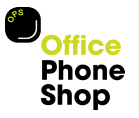
Ericsson Dialog 5446 IP Premium business phone
Using IP phones to make the most out of VoIP telephony
VoIP or Voice over Internet Protocol is a term used for making voice calls over the internet. It works by converting voice to digital packages and sending them out over the internet like any other data, such as emails. The destination of a VoIP call could be another VoIP user, a landline or even a mobile. In the case of a landline or a mobile, the VoIP call is ‘converted’ along the way, so it ends up as a ‘traditional’ phone call.
Traditional Telephony or TDM utilises either analogue or digital lines through a telephone system on site. In contrast, Hosted Telephony provides telecoms applications, switching and storage via a third party outside of the organisation. Data and voice communications are internet based, accessed over the public internet. In other words, telephones need to plug in to a router.
VoIP is extremely beneficial for businesses as it provides a seamless link between computer applications and other technologies. A VoIP phone system, also known as a hosted PBX, requires no investment in any telephone system hardware, which can make it more cost effective. In addition to cheaper telephone calls, having one supplier for both voice and data makes for greater business efficiency. Utilising IP telephony (the collective term for VoIP services) allows users to take full advantage of a range of features you would traditionally find on a PBX system.
Most VoIP services are feature-rich and easily scalable. Some of the benefits may include:
- Anonymous call block
- Call transfer, forwarding & hold
- Caller ID – Allowing you to see who is calling before you pick up the phone
- Call diversion – The ability to send incoming calls to other UK phone numbers
- Call waiting – The chance to take an incoming call while you’re still busy with another phone call
- Call conferencing
- Do not disturb – Have your calls instantly forwarded to your voicemail without ringing at your end
- Emergency calls – Previously lacking on some VoIP services, most providers now allow you to call emergency numbers just by dialling 999 as you would on a conventional phone
- Ring back – A feature that allows you to continually call a busy line until you get through
- Three-way calling – Particularly useful for small businesses looking to hold conference calls
- Voicemail – Not just an answering service on your phone, but one that can be accessed via email or online
- Mobile office
Hosted VoIP telephony is ideal for companies moving into a new office, needing to be up and running as quickly as possible. All they need is a data connection for the voice calls to run on, rather than having to wait for Openreach to install new lines, which could take over a month.
Telephone number flexibility
Another advantage to VoIP is being able to have a telephone number from anywhere in the UK. For example, an office in London, wanting to advertise in Manchester to attract more customers, could easily set up a Manchester number, but have the call ringing through to the London office. VoIP allows total flexibility with phone numbers, enabling organisations to extend their business reach by using any local area number no matter where they are located.
Disaster recovery
Unexpected events such as snow, floods or strikes don’t need to disrupt a business. VoIP systems sit in the “cloud” and have business continuity features that allow an organisation to carry on making and taking calls no matter what happens. Equally, if staff weren’t able make it to the office due to bad weather, they would be able to log in to the company’s partition of its hosted telephone system and divert calls to their mobile or another office.
What do you need for business VoIP?
One major requirement for VoIP telephony is a dedicated data connection. This avoids packet loss, which can occur when a data connection is shared for voice and standard internet usage. A data connection of at least 100k upstream is needed per user. VoIP telephony also requires specialist IP handsets, which tend to be more expensive than analogue ones.
Which IP business phone should you choose?
The Ericsson Dialog 5446 IP Premium is an application-oriented IP terminal. Modern and with a user-friendly interface, this IP business phone includes a large, colour, touch-screen display and features such as web browsing and self-labeling keys.
With icon-based menus, rather than text commands, navigation is both easy and intuitive. Similar to a smartphone in terms of its user-friendliness, the Ericsson Dialog 5446 IP Premium makes learning the features of the phone an easy process. Users can also synchronise their contacts with MS Office Outlook® and a Gigabit Ethernet switch allows for unrestricted bandwidth access when linking the Dialog 5446 IP Premium to a PC.
Future proofing of the Dialog 5446 IP Premium is safe with it supporting SIP1 and being fully compliant with the IMS standard.
For more information about VoIP business phones, contact the Office Phone Shop team on 0800 012 6637 or get in touch via the website.

